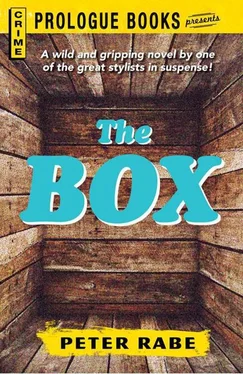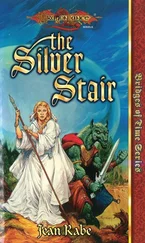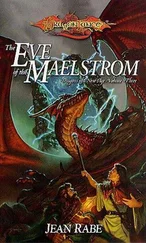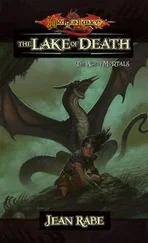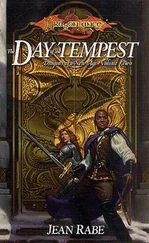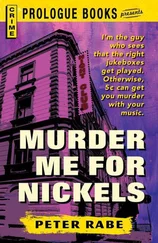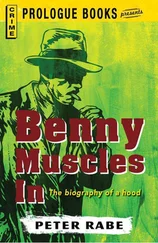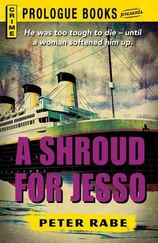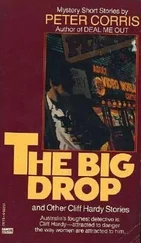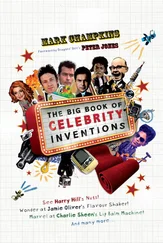Peter Rabe - The Box
Здесь есть возможность читать онлайн «Peter Rabe - The Box» весь текст электронной книги совершенно бесплатно (целиком полную версию без сокращений). В некоторых случаях можно слушать аудио, скачать через торрент в формате fb2 и присутствует краткое содержание. Жанр: Криминальный детектив, на английском языке. Описание произведения, (предисловие) а так же отзывы посетителей доступны на портале библиотеки ЛибКат.
- Название:The Box
- Автор:
- Жанр:
- Год:неизвестен
- ISBN:нет данных
- Рейтинг книги:5 / 5. Голосов: 1
-
Избранное:Добавить в избранное
- Отзывы:
-
Ваша оценка:
- 100
- 1
- 2
- 3
- 4
- 5
The Box: краткое содержание, описание и аннотация
Предлагаем к чтению аннотацию, описание, краткое содержание или предисловие (зависит от того, что написал сам автор книги «The Box»). Если вы не нашли необходимую информацию о книге — напишите в комментариях, мы постараемся отыскать её.
The Box — читать онлайн бесплатно полную книгу (весь текст) целиком
Ниже представлен текст книги, разбитый по страницам. Система сохранения места последней прочитанной страницы, позволяет с удобством читать онлайн бесплатно книгу «The Box», без необходимости каждый раз заново искать на чём Вы остановились. Поставьте закладку, и сможете в любой момент перейти на страницу, на которой закончили чтение.
Интервал:
Закладка:
Once he knew he was sweating inside his clothes and once he knew that he was dreaming. That stopped the dream. He knew he felt cold from the sweat on his skin and right after that his sleep became deeper and he no longer knew how he felt but just lay there, on the couch.
The trip lasted longer than Cipolla had said and they did not dock until sundown. When the engines stopped Quinn woke up and when he went topside he saw the pier next to the boat. The sun was down just behind a black line of mountain, and with the half light in the cool air Quinn had a moment’s impression that nothing had happened since the time he had stood by the warehouse in Okar, waiting for the day to be over and for the trip to start. This lasted a moment and then Quinn saw what there was.
The pier and the railroad track were close together; the dominant building was the railroad station. It was timeless with ugliness and could have fit Scranton, Pennsylvania, or Bangor, Maine. Though here it was uglier, trying to put the rest of the town to shame.
There was not much of the town. Narrow-chested gray buildings clapped up against the drop to the sea, all this on the North side of the bay, so that gloom seemed built into the town. Quinn saw how everyone stared on the pier, but then he decided it was the national habit. They stared at each other too. Police in blue and police in gray; they most likely had different jobs but they also just stood and stared.
“You going to unload whatever you got on this boat right here in the open?” Quinn asked Cipolla.
“While you were asleep,” said Cipolla, wishing to make a point of that, “we transferred at sea. I told you we got it all set up. Come on.”
They walked down a gangplank and then along the pier.
“For all I know,” said Quinn, “we could be in Scotland. I haven’t heard a word of Italian yet.”
“They know their place,” said Cipolla.
“Huh?”
“This is Mafia country.”
If this was an explanation, thought Quinn, it was a pretty gruesome one. Cipolla, the way he walked down the pier, seemed to take pride in his sentence, but the short, black-eyed men and the thick, leather-skinned women who stood around with their stares depressed Quinn and made him wish that he were some place else. Any place else, he thought, any place that’s not on the North side and where somebody screams now and then.
They walked down a narrow street, dank like a back alley, but full of the shops and stores which showed that this was a main street. Now there was noise, of course, men talking in cafes, women talking in shops, but to Quinn there was no ring to the sounds. There was no space for sound, really, on this North side of the mountain, and the eyes staring and the mouths hanging open, they said more, actually, thought Quinn, than any sound.
“Happy little community,” he said. “You like it here?”
“Lots of money around, if you know the ropes.”
If this is an explanation, thought Quinn, but then he dropped the thought. They stopped at a cafe with an awning over the sidewalk. If the headman holds forth here, Quinn thought, I’m going to be reminded of Remal in his hotel. Though the hotel looks better.
Cipolla talked to one of the waiters-it was rapid Italian or perhaps rapid Sicilian-and then they walked again.
“He told you what today’s password is, right?”
Cipolla only shrugged.
They walked. Lights went on in some windows and in some of the stores, the naked bulb usually, and sometimes a kerosene lamp which threw more shadow than light.
“We’re almost out of town,” said Quinn. “Where does he live, in a cave?”
Cipolla stopped in the middle of the street, and if there were enough light, thought Quinn, his face would now show red like a turkey’s wattles.
“You listen to me, bum,” said Cipolla. “You come down here knocking this place right from the start and you don’t get nowhere. I like this place. People here like this place, and if you know what pride means…”
“Yeah, yeah, yeah,” said Quinn. “When you’re poor and dirty you can always say, I got pride. Lead the way.”
Cipolla said something filthy in Sicilian-the language, Quinn had noticed, did not have the ring and the sing of Italian. Quinn thought, you can probably say something filthy better in Sicilian than in any other language. They walked, and Quinn wondered whether the man they would see knew as little about Quinn’s coming as Quinn knew about the thing he was going into.
There was a big wooden door which opened right from the street into somebody’s windowless apartment. They walked through that past a woman in black who stood at a stove and past an old man in a bed who was looking at a lit candle which stood on a chair next to the bed. They walked out through a back door scaring five cats away from a garbage pail, and, on the other side of this yard which was made by the backs of old houses, a yard like the bottom of a shaft, they walked into a whitewashed kitchen. This kitchen seemed as naked as the bulb which hung from the ceiling and the place smelled only from the damp. No food around, no smell of food, no sign of use.
“You wait here,” said Cipolla, and walked on through a door.
This could definitely not be some place in Scranton or in Brooklyn or any other depressing place I know, Quinn thought while he lit a cigarette, but this could definitely be the place which all the others-with bad light and bad air and bad altogether-have used for a model. Patience now, he said to himself, patience. Wait till you meet the educated animal that lives here.
Cipolla opened the door and jerked his head and then disappeared again down a dark corridor.
When Quinn walked into the room at the other end he thought, yes, now this on the other hand could be in Scranton or in Brooklyn. There was mail-order furniture and there was a big console TV. Then the man got up from the maroon couch and Quinn was really surprised.
He was short, just like everyone else seemed to be in this town, but he had a pink face, white hair, and he was smiling. He said, “Hi, there,” with no accent at all and held his hand out in the friendliest way. Only wrong note, thought Quinn, is that ring there. Big diamond with collar of baguettes, all on one little finger. Santa Claus wearing jewelry.
Quinn shook hands and said he was Quinn, and the other one said, “Yes, I know. My name’s Motta. Just like the ice cream.”
Quinn did not know that Motta was an ice cream but he thought that was a nice, innocent comparison to make and who might Motta be.
Cipolla came and went while Motta and Quinn sat down on the maroon couch. The couch creaked and it smelled of moth balls. Quinn smelled the moth balls and looked at the antimacassars on the arm-rests of the couch, wondering who the woman in the house might be. There was a brown photo of a couple on the wall and behind the framed photo somebody had stuck a palm frond at a slant. This palm frond was as brown and yellow as the young couple in the picture. The man was stiff with starch and waxed mustache, and the woman stiff with whalebone and laces.
“Mother and Dad,” said Motta. “They died in the States. Poor as church mice, but proud. Never took a dime from me, rest their souls.”
The woman who came into the room now looked like the grandmother of the couple in the picture, though she was really the daughter and Motta called her Sis.
Sis put three espresso cups on the round table, a small pressure pot full of hot coffee, and a white jug which held hot milk. Cipolla came in with a bowl of sugar and then the old woman left without having said a word.
“Half and half?” said Motta. “I take mine black.”
Quinn took half milk and half coffee and Motta took half coffee and half sugar. Cipolla had nothing. He sat and watched.
Читать дальшеИнтервал:
Закладка:
Похожие книги на «The Box»
Представляем Вашему вниманию похожие книги на «The Box» списком для выбора. Мы отобрали схожую по названию и смыслу литературу в надежде предоставить читателям больше вариантов отыскать новые, интересные, ещё непрочитанные произведения.
Обсуждение, отзывы о книге «The Box» и просто собственные мнения читателей. Оставьте ваши комментарии, напишите, что Вы думаете о произведении, его смысле или главных героях. Укажите что конкретно понравилось, а что нет, и почему Вы так считаете.
